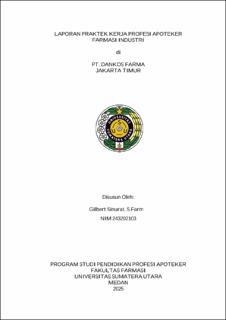| dc.description.abstract | Background: The pharmaceutical industry is a business entity that is licensed to manufacture medicinal products or raw materials. These activities must strictly follow the guidelines of Good Manufacturing Practice (GMP). GMP encompasses all aspects of production and quality control, covering every step from material reception, production, repackaging, labeling, relabeling, quality control, product release, storage, and distribution of medicines. Pharmacists play a critical role in ensuring all stages of the process adhere to these stringent GMP guidelines.
Objective: This pharmacist professional practice was conducted to enhance the prospective pharmacist’s understanding of the pharmacist's roles and responsibilities within the pharmaceutical industry, comprehend the practical application of Good Manufacturing Practice (GMP), and gain a realistic overview of the production flow of pharmaceutical preparations in the industry.
Summary: The professional internship activities at the pharmaceutical company PT. Dankos Farma were carried out for two months, from January 2nd to February 28th, 2025, specifically within the Beta-Lactam Penicillin preparation production department. During the internship, practical training was undertaken to understand the production process flow of beta-lactam preparations, starting from the reception of raw materials from logistics, through the production process and In-Process Control (IPC), up to the secondary packaging stage. Supervision and monitoring throughout the production process aimed to ensure that the manufactured products comply with GMP standards, are safe, and guarantee the quality of the finished preparations. Effective monitoring during all production stages was also intended to minimize potential losses due to process errors.
Conclusion: Following the two-month professional internship at PT. Dankos Farma, it can be concluded that pharmacists hold essential responsibilities and act as key personnel in the pharmaceutical industry at PT. Dankos Farma, particularly in the fields of Quality Control, Quality Assurance, and Production (in accordance with GMP 2024 guidelines). The prospective pharmacist has gained a thorough understanding of the application of GMP aspects within the pharmaceutical industry, especially at PT. Dankos Farma. PT. Dankos Farma has effectively implemented every aspect of GMP, including the quality system, personnel, premises and facilities, equipment, production, storage and distribution, quality control, self-inspection, complaints and product recall, documentation, outsourced activities, as well as qualification and validation. | en_US |


